Executive Summary
Excellent writing skills are not just a choice for students these days, but a necessity. Along with reading skills, writing skills not only predicts a student’s future in academics, but also in the real life situation. Yet many students in junior and senior high are still struggling with the basic writing skills. Many of these students cannot even pass a basic writing proficiency test and lacks fundamental literacy skills required for the current set of courses administered in high school. Since literacy incorporates both writing and reading skills, lack of both skills could lead to the literacy crisis.
For this reason, this report will explore a number of techniques that could help schools to avert such crisis by improving student’s writing skills. The report will emphasize on various techniques that could be used by instructors to assess writing proficiency among students and provide feedback to the students in an appropriate manner. The report will be based on analysis of various literatures, interviews with instructors and questionnaires administered to the learners. There are numerous techniques that can be used to enhance writing skills and, therefore, the report will focus on a few of them.
Introduction
Overview
Although many countries have made significant strides in improving the literacy of its citizens, the literacy level of high school students, particularly the adolescents are still a matter of concern (Lemke et al., 2004, p. 3). As a result, governments have turned their attention to the need to enhance the literacy level of high school students, which include improving their writing skills. An example of such initiatives is the creation of the Striving Writers/Readers Initiative, a program that was launched in all the district schools in the U.S (Olson, 2006, p. 19). Surveys in the institutions of higher learning have also revealed that the skills most students lack are writing skills (Lemke et al., 2004, p. 4).
Many studies have always assumed that students who are highly proficient in reading are supposed to be proficient readers (Fitzgerald & Shanahan, 2000, p. 39). If this was the case, enhancing students’ reading skills will automatically improve their writing skills. However, even though the two literary skills are complimentary who development is almost comparable, they do not have a crystal-clear relationship. This is because many high students are able to pass average reading proficiency tests but are not able to do the same when it come to reading. In addition, the nature of relationship between the two literary skills changes with time (Fitzgerald & Shanahan, 2000, p. 40).
Alongside speaking, writing is the most significant means of expression. Students can also use their writing skills to construct a meaning, convey their feelings and articulate their experience. In other words, writing can be used to reason, comprehend and gain knowledge. That is how important writing skills are to students, hence the main focus of our study (Lemke et al., 2004, p. 4).
Purpose of the Report
The purpose of this report is to come up with techniques that would help students improve and develop their writing skills. The report is aimed at high school adolescent students who have been found by numerous studies to have very poor writing proficiency. These techniques will not only help these students to enhance their writing skills, but also help to enhance their abilities. Therefore, by the end of compilation, this report should be able to answer the following questions:
- What are the most appropriate techniques that should be used to help improve writing proficiency among high school students?
- How should these techniques be assessed?
- Which approach can be employed by the instructors to correct student’s writing errors without affecting their self-confidence?
Literature Review
This chapter presents an analysis of different types of literatures linked to the subject of study, that is, techniques for improving writing skills. The literature review heavily relied on online academic databases, making use of search phrases and terms, including, but not restricted to writing skills and writing techniques. The literature review was mainly based on books and journals.
According to Cushing (2002, p. 15), writing in its proper form is worth more than any other literal skills, hence it is essential for students to perfect their writing skills. There are numerous techniques that can be used to enhance writing skills among students. However, since the study is brief, the report will only focus on the most significant techniques often used in the classroom setup. The most difficult aspect of writing is getting started with the whole process of writing (Cowley, 2004, p. 3).
Cowley (2004, p. 5) highlights a number of reasons why high school students have trouble with this. One of the reasons is that most students are generally scared of failure. For this reason, it is the responsibility of the teachers to make such students as calm and comfortable as possible. This can be achieved by letting them make mistakes and helping them to correct the mistakes later (Cowley, 2004, p. 5).
Another reason is choosing the right topic to write about. The process of gathering information and developing ideas is always thorny (Cowley, 2004, p. 5). Fitzgerald and Shanahan (2000, p. 45) recommends writing through imagination, which they argue works for nearly all the topics. Brainstorming through groups is another way of gaining information that can be useful in starting the writing process (Fitzgerald & Shanahan, 2000, p. 46). Pritchard and Honeycutt (2006) emphasize on the significance of instructors in the brainstorming process. They can help the students come up with the topics, which they can elaborate on during group sessions. At the end of the discussion, the group can decide on the topics to write about. Before students can start writing, they have to go through the ideas with their teacher for further clarification (Pritchard &Honeycutt, 2006, p. 282).
According to Cowley (2004, p. 9), no matter the technique used, teachers must provide inspiration and create an ample environment for writing. Inspiration could be in the form of encouraging students to write about their role models, favourite TV personalities and dream cars among others. On the other hand, an ample atmosphere for writing can be created by minimizing pressure on students and correcting them in a manner that do not affect their confidence (Cushing, 2002, p. 16). Cowley (2004, p. 10) claims that if students were to write about their favourite musician, an ample atmosphere can be created by allowing them to listen to their music. In addition, vivid sounds like wind or perhaps animal sounds could inspire students to write about stories associated with ghosts or fairy tales.
Minto (n.d.) introduced the pyramid principle in writing. This basically refers to thinking and writing in a structured manner. Pyramid principle in writing entails writing down ideas, undertaking iteration to refine them and arranging the ideas in a pyramid form/level. The ideas within the same pyramid level must be of a similar kind and complication, and must be arranged in a logical manner. The application of the pyramid principle in writing requires a lot of practice (Minto, n.d., p. 10).
White and Valerie (1991, p. 12) emphasizes on the importance of evaluation during the writing process. Evaluation not only helps the students to enhance their writing skills, but also assists instructors to improve on their methods of teaching. However, the evaluation process should not affect student’s confidence. For this reason, it is important to include students in the evaluation process. In fact, students should evaluate their own work with the help of their teachers. This will ensure that they do not have problem in correcting their work in the future (White & Valerie, 1991, p. 13). White and Valerie (1991, p. 15) add that students should be prepared mentally that many people will read their work. This will make them become more careful in their writing.
Methodology
The information in this chapter was based on the analysis and review of various literatures linked to our topic of study. These studies emphasized on the significance of writing skills in academic performance, as well as civic and universal matters. The information acquired from the analysis and review of these literatures helped in designing questionnaires and creation of the interview framework. The interview framework and questionnaire design were based on the tips provided by Benjamin (1981). The interview was more of a conversation than a monologue and it was based on open questions. This is because open questions can provide more information than closed questions (Benjamin, 1981, p. 83).
Sample Size
The study was conducted in an upper secondary school in the local district. The school had a population of an approximately 600 students. The school provides both theoretical and practical courses. The students were given the chance to contribute to the study and their rate of response was noted as the researcher collected data. Their contribution was on a voluntary and confidential basis. The researcher already had the demographic profiles of each student, which he got from the school administration. The targeted sample size was 300, which comprises of 9th graders taking English and History. Among these, 52% were male (n= 156), and 48% were female (n=144). The average age of these students was between 13 to 15 years. Only two teachers were interviewed, that is, English and History teacher for 9th graders.
Study Procedure
As already been mentioned, participation was on a voluntary and confidential basis. Data collection was done in two phases. The first phase is interview of both English and History teacher. The second phase is administration and analysis of questionnaires.
Results/Findings
Interviews
Do they involve students in choosing topics to write about?
The English teacher stated that she does not involve students since students the school does not permit such liberty. Instead, she provides the topics. In most cases, the topics have to be fresh. On the other hand, the History teacher involved students in choosing the topics. He claims that students in his class are full of ideas and are highly motivated.
How do they evaluate students writing skills?
The English teacher focused on the sentence structure, punctuations and grammar. However, she conceded that reasoning is the most common problem among students. On the contrary, the history teacher emphasizes on reasoning. Nonetheless, both teachers did not undertake a comprehensive evaluation.
How do they solve start up problems in writing among students?
The English teacher explained that she always gives students opening sentences or a continuation of a narrative. The students can choose between them. On the other hand, the History teacher used opening sentences and brainstorming.
Do they have a specific technique to create a specific environment during a writing session?
The English teacher conceded that she did not have any specific technique. However, the History teacher said that he always tries to create a very quiet environment during the writing process.
How did they correct errors in writing?
The English teacher was very thorough. She engaged each student one on one. Similarly, History teacher did not take any written error for granted. However, she did allow students to identify the errors themselves through group discussions.
How did they assess students’ development?
The English basically relied on grades and group members. However, the history teacher taught students how to evaluate their own work through groups. He argued that it was the only way of making sure such mistakes are avoided in the future.
Questionnaires Results
The questionnaire (see appendix 1) was filled by all the students since it only targeted 260 students because some students were absent and others engaged in other activities. The respondents from the English class were 160, whereas the history class was 100. The students were to give their opinion on the five statements.
I have opted to illustrate the results in bar charts. The question is available in appendix 1. For each statement in the questionnaire, they were to be ranked from 1 to 4. The numbers represented the following: 1- I disagree totally; 2-disagree a little; 3-I agree a little; and 4 –I agree totally.
I want the instructor to correct all my written errors
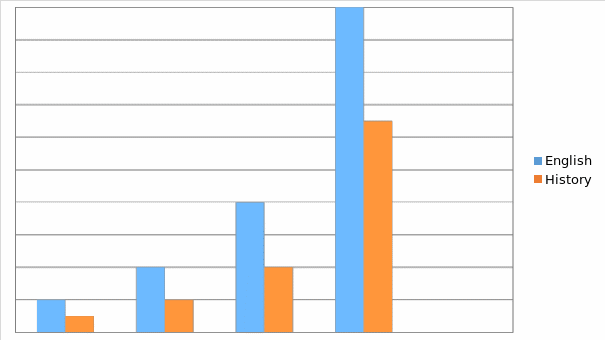
The chart shows that the majority of the students had no problem being corrected by their teachers. However, a slightly higher number had doubts about it. Only a few disagreed. Therefore, a high number of students prefer to be corrected by their teacher and did not fear being corrected.
Students participate in deciding topics
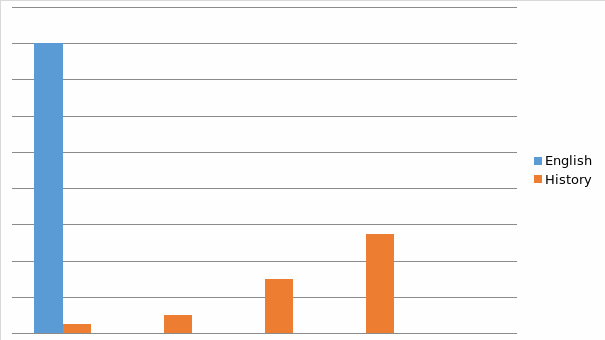
The English students totally disagreed. However, majority of history students agreed with the statement.
Students believed starting up writing is difficult
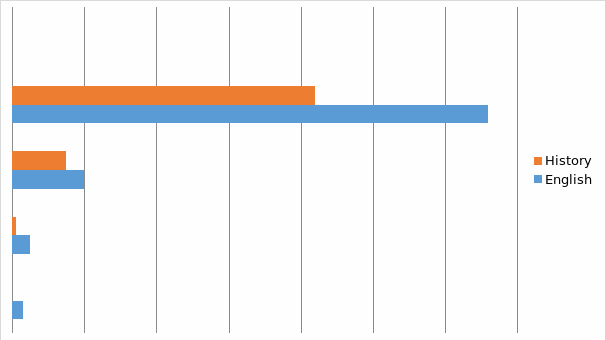
The majority of students from both classes agreed with the statement. This is consistent with the literature review.
Students write better under a specific atmosphere
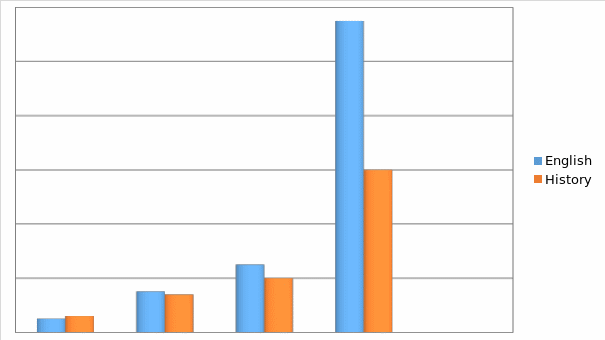
Most students from both English and History class agreed with the statement. Only a few disagreed. This is in line with Cowley (2004, p. 10).
I prefer brainstorming/group discussion to enhance my writing skills
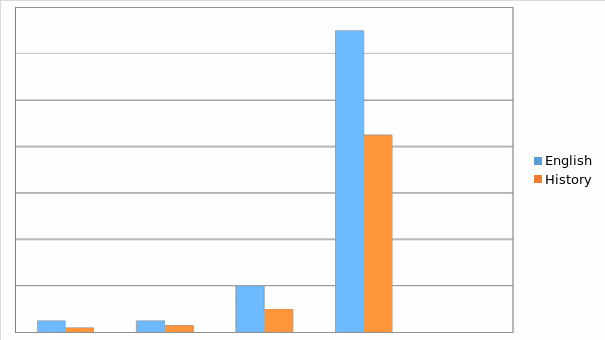
The majority favoured group discussion and brainstorming to enhance their writing skills.
Conclusion and Recommendation
There are numerous techniques used to enhance writing skills among high school students. However, the report only focused on the fundamental techniques. In addition, the questionnaire did not asses the evaluation of students in the evaluation process due to time constraints. The analysis of the study was based on the literature review to answer the three research questions. The report established that teachers are very strict and do not provide the much needed freedom that is essential in enhancing writing skills among high school students. This is inconsistent with the existing studies, which advocates for flexible approaches. The most common techniques used include brainstorming, creation of ample environment and group evaluations. The report recommends the use of the pyramid principle in writing. Even though it requires a lot of practice, it has proven to be more efficient than the conventional techniques.
References
Benjamin, A. (1981). The helping interview. Boston: Houghton Miffin Company. Web.
Cushing, W. S. (2002). Assessing Writing. Cambridge: Cambridge University Press. Web.
Cowley, S. (2004). Getting the buggers to write 2. London: Continuum. Web.
Fitzgerald, J., & Shanahan, T. (2000). Reading and writing relations and their development. Educational Psychologist, 35, 39–50. Web.
Lemke, M., Sen, A., Pahlke, E., Partelow, L., Miller, D., & Williams, T. (2004). International outcomes of learning in mathematics, literacy, and problem solving: PISA 2003 results from the U.S. perspective. Washington, DC: National Center for Education Statistics. Web.
Minto, B. (n.d.). Improving Writing Skills: Pyramid Principle. Web.
Nagin, C. (2003). Because writing matters: Improving student writing in our schools. San Francisco, CA: Jossey-Bass. Web.
Olson, L. (2006). A decade of effort. Quality Counts, 25, 8, 18–21. Web.
Pritchard, R. J., & Honeycutt, J. (2006). Process writing. In C. MacArthur, S. Graham, & J. Fitzgerald (Eds.), Handbook of writing research (pp. 275–290). New York: Guilford. Web.
White, R., & Valerie, A. (1991). Process writing. Harlow: Longman. Web.